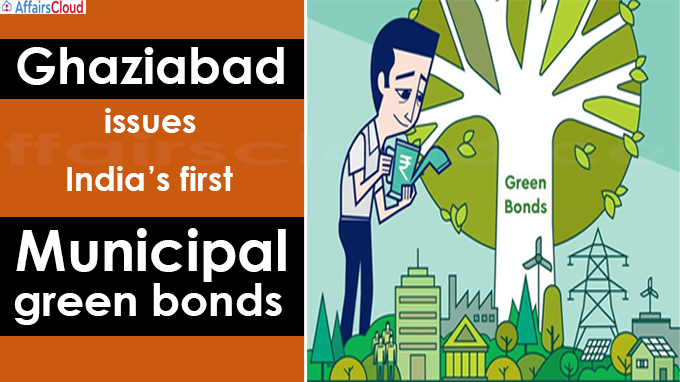 Ghaziabad Municipal Corporation, a civic body in Uttar Pradesh(UP), has become India’s first municipal corporation to issue municipal green bonds.
Ghaziabad Municipal Corporation, a civic body in Uttar Pradesh(UP), has become India’s first municipal corporation to issue municipal green bonds.
- On April 8, 2021, Ghaziabad Municipal Corporation issued municipal green bonds in BSE and raised Rs 150 crore (Base Issue: 100 Crore with the greenshoe option of 50 Crore).
- The corporation has received Rs 19.5 crore incentive from the Union government for raising funds through municipal bonds.
- The merchant bankers to the bond issue were A K Capital Services Ltd and HDFC Bank Ltd.
Purpose:
- Funds of these green bonds will be used for the construction of a tertiary sewage treatment plant (estimated to cost approximately Rs 239.93 crore) to benefit industries in Ghaziabad.
- This Municipal bond was issued as green bonds as the purpose comes underwater management i.e recycling.
- The Ghaziabad Municipal Corporation (GMC) has entered into an understanding with Sahibabad Industries Association for the purpose of achieving various goals and objectives relating to the water supply.
Key points:
- After this issuance, Ghaziabad became the 10th city in India and the 2nd city in UP to raise Municipal Bonds (Lucknow 1st in UP)
- Other 9 cities that issued municipal bonds in India – Pune, Hyderabad, Indore, Amravati, Bhopal, Visakhapatnam, Ahmedabad, Surat and Lucknow.
- The Bangalore Municipal Corporation issued municipal bonds for the first time in 1997
- Indore, Madhya Pradesh became the first state to get its municipal bonds listed on the National Stock Exchange(NSE).
About the Ghaziabad’s bond:
- The coupon rate – 8.1% per annum (The most competitive rate so far for Municipal Bonds in India)
- Rating: The bond was rated AA by India Ratings and AA(CE) by Brickworks
- Maturity – 10 years.
- The bonds got oversubscribed with at least 40 bids worth over Rs 401 crore.
About Green bonds:
- Green Bond is a debt instrument that is specially reserved to raise money for climate and environmental projects. In 2009, the first official Green Bond was released by the World Bank.
Projects under Green Debt Securities (As per the SEBI (Issue and Listing of Debt Securities) Regulations, 2008)
- Renewable and sustainable energy including wind, solar, bioenergy, other sources of energy that use clean technology.
- Clean transportation including mass/public transportation.
- Sustainable water management including clean and/or drinking water, water recycling.
- Climate change adaptation
- Energy efficiency including efficient and green buildings.
- Sustainable waste management including recycling, waste to energy, efficient disposal of wastage.
- Sustainable land use including sustainable forestry and agriculture, afforestation.
- Biodiversity conservation.
Recent Related News:
On March 16, 2021, Deutsche Bank and Continuum Energy Levanter Pte Ltd, a subsidiary of Continuum Green Energy (Continuum) executed the world’s 1st green hedging transaction based on a specially designed green hedge framework with a second party opinion.
About the RBI’s study on Green bonds:
- Green bonds constituted only 0.7% of all the bonds issued in India since 2018.
- The bank lending to the non-conventional energy constituted about 7.9% of outstanding bank credit to the power sector, as of March 2020
- The Green Bonds have higher average coupon rates than the corporate government bonds with similar tenure of (5/10 years).
AffairsCloud Recommends Oliveboard Mock Test
AffairsCloud Ebook - Support Us to Grow
Govt Jobs by Category
Bank Jobs Notification




